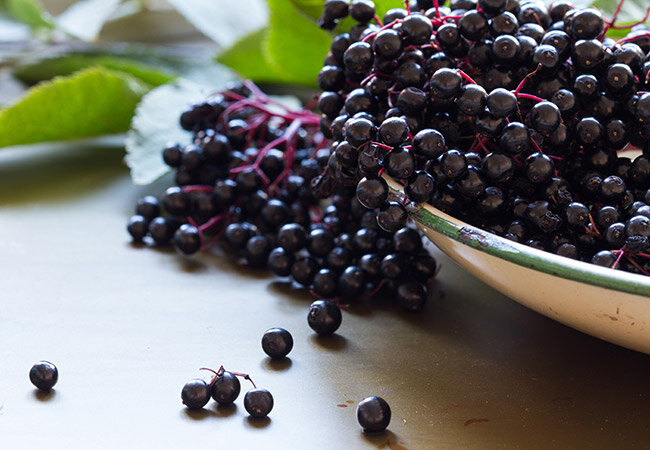COVID-19 and Elderberry
The RUMOR!
“Elderberry causes cytokine storms and is deadly if taken with COVID-19.”
I will first premise that Elderberry (Sambucus Nigra) has been used for centuries as a way to boost immune response, and it is great as a topical agent as well. Elderberry is high in Vitamins A, C, B6, Iron, and Potassium. It is abundant in cancer-fighting and anti-viral properties. Elderberry has long been used as food and medicine. Herbs like the elderberry contain a diverse mixture of phytochemicals that have a complex interaction with the body. They do not work using only one mechanism, and they may work differently for different people at different times. Because of their complexity, herbalists consider herbs to be supporters of physiology rather than overly stimulating in terms of an immune response (unless there is toxicity involved, which is not the case with Elderberry).
What is Cytokine Response Syndrome (CRS)?
Cytokines are cellular communication molecules that the immune system uses to communicate with itself and mobilize the healing response. They are used for local communication between immune cells and local tissues. It is important to understand the nature of a cytokine storm. You can think of it as a kind of a power surge in the body that can cause even more damage than the body has already experienced. A cytokine storm is experienced in the advanced stages of infection, such as sepsis or acute respiratory distress syndrome (ARDS), when there is already a significant amount of damage to the tissues in the body. The body sends an overwhelming number of messages to try and mobilize the healing response and activate immune cells, but the messages end up jamming the system and spilling over into systemic circulation. The resulting influx of too many activated immune cells ends up causing additional damage to the tissues.
By the time a cytokine storm may be experienced in a respiratory distress situation, a person would most likely be in a significantly compromised state and may already be in the ICU on life-saving respiration equipment with care being managed by medical professionals. (1)
Let’s dig a bit deeper….COVID-19 and Elderberry.
What do the facts say?
Rumors: “Elderberry is proven to increase cytokines and in immunosuppressed people, can cause a dangerous cytokine storm. Since Covid-19 resides in the lungs, causing fibrosis of the connective tissue, additional inflammation can really reduce lung volume.” This is based on a study conducted in 2001.(2)
Facts: The 2001 study referenced for this rumor involves healthy volunteers and the popular Elderberry product Sambucol®. In that study, researchers concluded, “Sambucol might, therefore, be beneficial to the immune system activation and in the inflammatory process in healthy individuals.” (2) The key to take from this study is that Elderberry supported cytokine production during a healthy inflammatory process related to the optimal immune function that was beneficial in this situation. However, the research DID NOT suggest it would stimulate a cytokine storm in patients that have an underlying condition that may tax the immune system.
(This is what many are using as their source for assumptions on the use of the Elderberry during COVID19. Unfortunately, they have not provided scientific facts to support this. )
AND… Get this:
In a 2016 study, “The role of inflammatory cytokines in the development of atherosclerotic lesions” described available data on the possible inflammatory mechanisms of the atherogenesis with special attention to the role of cytokines. It was shown to inhibit cytokines in people who had atherosclerosis. Scientists developed an herbal preparation of black elderberries (Sambucus nigra L.), violet tricolor herb (Viola tricolor L.) and calendula flowers (Calendula officinalis L.) which possessed anti-cytokine activity.” (3)
The point proved from this study is that the cytokines were not helpful to the overall situation, and Elderberry did not stimulate cytokine production.
Cytokine storms are rare in human physiology. It is not likely to be able to cause CRS to happen by itself, and there have been no causative links of Elderberry or any herbs associated with CRS. CRS is caused by a severe amount of damage to the tissues and activated immune cells in later stages of infection, and therefore should be managed by medical professionals.
Sources are posted below for your reading privileges. I absolutely am a science nerd and love all things research, so please read and become informed on the facts.
Based on the evidence provided in these studies, Elderberry doesn’t cause cytokine storms as the rumors have it. Elderberry is a great immune booster.
I hope this clears up any confusion. As I always tell my customers, please always consult your physician before starting the use of any herb. Elderberry will always be an OG favorite, and I will personally use it for my family.
Handcrafted with love always,
Dina Caballero
-Organic Girly
This article is not intended for the purpose of providing medical advice. All information, content, and material found in this article is for informational purposes only and is not intended to serve as a substitute for the consultation, diagnosis, and/or medical treatment of a qualified physician or healthcare provider.
Sources:
1 Tisoncik JR, Korth MJ, Simmons CP, Farrar J, Martin TR, & Katze MG. Into the eye of the cytokine storm. Microbiol Mol Biol Rev. 2012 Mar 76(1): 16-32. https://www.ncbi.nlm.nih.gov/pmc/articles/PMC3294426/
2 Barak V, Halperin T, and Kalickman I. The effect of Sambucol, a black Elderberry-based, natural product, on the production of human cytokines: I. inflammatory cytokines. European Cytokine Network 12, no. 2 (June 2001): 290–96. https://www.ncbi.nlm.nih.gov/pubmed/11399518
3 Kirichenko TV, Sobenin IA, Nikolic D, Rizzo M, and Orekhov AN. Anti-cytokine therapy for prevention of atherosclerosis. Phytomedicine: International Journal of Phytotherapy and Phytopharmacology 23, no. 11 (October 15, 2016): 1198–1210. https://doi.org/10.1016/j.phymed.2015.12.002.
